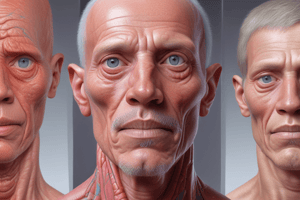Podcast
Questions and Answers
Which gene is responsible for causing Marfan Syndrome?
Which gene is responsible for causing Marfan Syndrome?
- Marfan gene
- Fibrillin
- FBN1 (correct)
- Mutation gene
Which systems are primarily affected by Marfan Syndrome?
Which systems are primarily affected by Marfan Syndrome?
- Respiratory, digestive, and nervous systems
- Endocrine, immune, and urinary systems
- Muscular, integumentary, and lymphatic systems
- Cardiovascular, skeletal, and ocular systems (correct)
What is the impact of Marfan Syndrome on the skeletal system?
What is the impact of Marfan Syndrome on the skeletal system?
- Bone deformities (correct)
- Decreased bone density
- No impact on bones
- Increased bone density
Flashcards are hidden until you start studying
Study Notes
Marfan Syndrome
- Caused by mutations in the FBN1 gene, which codes for fibrillin-1, a protein essential for connective tissue structure and function.
Affected Systems
- Cardiovascular system: affects the aorta, heart valves, and blood vessels, leading to aortic aneurysms, aortic dissection, and mitral valve prolapse.
- Skeletal system: characterized by tall stature, long limbs, and arachnodactyly (spider-like fingers).
- Ocular system: affects the eyes, leading to lens dislocation, retinal detachment, and other vision problems.
- Nervous system: can cause dural ectasia, a condition that leads to herniation of the dura mater, a protective membrane surrounding the spinal cord and brain.
Skeletal System Impact
- Leads to tall stature, typically above 6 feet 5 inches, and long limbs, arms, and fingers.
- Causes arachnodactyly, also known as "spider fingers," due to the long and slender fingers.
- May result in scoliosis, kyphosis, and other spinal abnormalities.
Studying That Suits You
Use AI to generate personalized quizzes and flashcards to suit your learning preferences.




